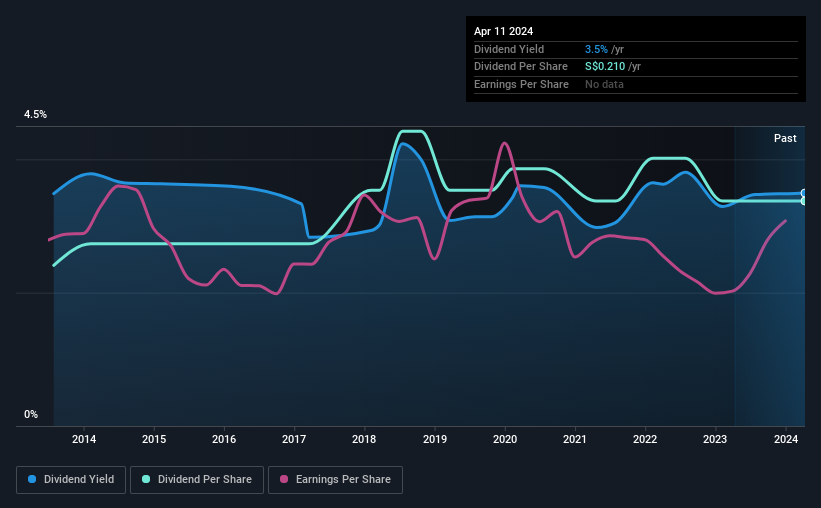United Overseas Insurance (SGX:U13) Will Pay A Dividend Of SGD0.125
United Overseas Insurance Limited (SGX:U13) will pay a dividend of SGD0.125 on the 15th of May. This means that the annual payment will be 3.5% of the current stock price, which is in line with the average for the industry.
See our latest analysis for United Overseas Insurance
United Overseas Insurance's Earnings Easily Cover The Distributions
We aren't too impressed by dividend yields unless they can be sustained over time. However, United Overseas Insurance's earnings easily cover the dividend. This means that most of what the business earns is being used to help it grow.
Looking forward, earnings per share could rise by 4.2% over the next year if the trend from the last few years continues. If the dividend continues along recent trends, we estimate the payout ratio will be 43%, which is in the range that makes us comfortable with the sustainability of the dividend.
Dividend Volatility
The company has a long dividend track record, but it doesn't look great with cuts in the past. Since 2014, the dividend has gone from SGD0.15 total annually to SGD0.21. This works out to be a compound annual growth rate (CAGR) of approximately 3.4% a year over that time. The dividend has seen some fluctuations in the past, so even though the dividend was raised this year, we should remember that it has been cut in the past.
Dividend Growth May Be Hard To Achieve
Given that the dividend has been cut in the past, we need to check if earnings are growing and if that might lead to stronger dividends in the future. Earnings have grown at around 4.2% a year for the past five years, which isn't massive but still better than seeing them shrink. If United Overseas Insurance is struggling to find viable investments, it always has the option to increase its payout ratio to pay more to shareholders.
In Summary
Overall, a consistent dividend is a good thing, and we think that United Overseas Insurance has the ability to continue this into the future. The dividend has been at reasonable levels historically, but that hasn't translated into a consistent payment. This looks like it could be a good dividend stock going forward, but we would note that the payout ratio has been at higher levels in the past so it could happen again.
Market movements attest to how highly valued a consistent dividend policy is compared to one which is more unpredictable. Meanwhile, despite the importance of dividend payments, they are not the only factors our readers should know when assessing a company. Case in point: We've spotted 2 warning signs for United Overseas Insurance (of which 1 is a bit unpleasant!) you should know about. Looking for more high-yielding dividend ideas? Try our collection of strong dividend payers.
Have feedback on this article? Concerned about the content? Get in touch with us directly. Alternatively, email editorial-team (at) simplywallst.com.
This article by Simply Wall St is general in nature. We provide commentary based on historical data and analyst forecasts only using an unbiased methodology and our articles are not intended to be financial advice. It does not constitute a recommendation to buy or sell any stock, and does not take account of your objectives, or your financial situation. We aim to bring you long-term focused analysis driven by fundamental data. Note that our analysis may not factor in the latest price-sensitive company announcements or qualitative material. Simply Wall St has no position in any stocks mentioned.

 Yahoo Finance
Yahoo Finance 
